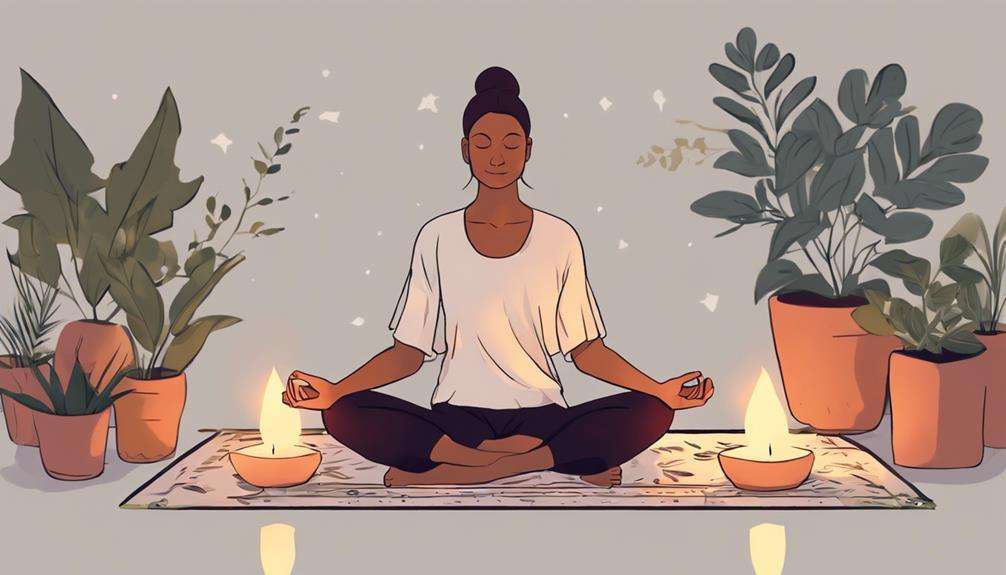Did you know that according to a study published in JAMA Internal Medicine, meditation can decrease symptoms of depression and anxiety by up to 10-20% compared to those who don't meditate?
The practice of meditation offers a myriad of benefits that extend beyond just mental health. It can provide you with a toolkit to navigate life's challenges, enhance your emotional intelligence, and foster a sense of inner peace and contentment.
So, why not take a moment to explore how meditation can help you achieve emotional balance and harmony in your everyday life?
Key Takeaways
- Meditation reduces symptoms of depression and anxiety, promoting emotional stability.
- Mindfulness techniques enhance emotional intelligence and inner peace.
- Breathing exercises and visualization practices foster emotional well-being.
- Mantra meditation calms thoughts and promotes mental clarity for emotional equilibrium.
Benefits of Meditation for Emotional Balance
Unlock the potential of meditation to cultivate emotional balance by exploring its profound benefits on your mind and well-being. Meditation plays a crucial role in enhancing emotional balance through various mechanisms. By reducing activity in the amygdala, the brain's emotional center, meditation helps regulate emotions effectively. Additionally, mindful meditation has been found to increase gray matter in brain regions responsible for self-awareness and emotional regulation, leading to improved emotional intelligence. This heightened emotional intelligence translates into better self-control and empathy towards others, fostering harmonious relationships.
Moreover, the stress-reducing effects of meditation are significant in promoting emotional balance. By lowering cortisol levels, the stress hormone, meditation alleviates the burden of stress and anxiety, allowing for a more stable emotional state. Studies have also shown that regular meditation practice can increase positive emotions such as kindness, compassion, and joy. These positive emotions contribute to overall emotional well-being, creating a more balanced and harmonious inner life. By incorporating meditation into your routine, you can experience these transformative benefits firsthand.
Mindfulness Techniques for Emotional Harmony
To enhance emotional harmony, delve into mindfulness techniques that promote self-awareness and emotional regulation. Mindfulness techniques are powerful tools that can assist you in achieving emotional balance and harmony. By incorporating these practices into your daily routine, you can experience a profound shift in how you perceive and manage your emotions.
Here are three key mindfulness techniques to cultivate emotional harmony:
- Engage in mindful breathing exercises to center yourself and promote emotional calmness.
- Practice body scans to increase self-awareness and connect with your emotions on a deeper level.
- Focus on the present moment through mindfulness meditation to observe and regulate your emotional responses effectively.
These techniques enable you to navigate challenging emotions with grace and composure. By incorporating mindfulness into your life, you can reduce the impact of stress hormones, leading to improved emotional well-being and overall harmony.
Breathing Exercises for Emotional Stability

Enhance your emotional stability through the practice of effective breathing exercises that stimulate the body's relaxation response. Controlled breathing techniques play a vital role in managing stress levels and promoting emotional well-being.
By engaging in mindful breathing practices, you can enhance your emotional stability and reduce the impact of mood swings on your daily life. Deep breathing exercises have the power to regulate emotions by activating the body's relaxation response, which in turn can reduce the levels of stress hormones like cortisol and promote feelings of calmness.
Diaphragmatic breathing, specifically, can increase the flow of oxygen to the brain, helping improve emotional stability. Consistent practice of breathing exercises is key to managing emotional fluctuations and fostering a sense of harmony within yourself.
Incorporating these meditation techniques into your daily routine can significantly contribute to your overall emotional balance and well-being.
Visualization Practices for Inner Peace
Transitioning from breathing exercises, visualization practices in meditation offer a powerful method for fostering inner peace and emotional well-being by harnessing the potential of mental imagery. By engaging in visualization practices, you can effectively reduce stress and anxiety while promoting a sense of calmness and harmony within yourself. Here are three key benefits of incorporating visualization techniques into your meditation routine:
- Reducing Stress: Visualization allows you to create a mental sanctuary where you can escape from the pressures of daily life, helping to lower stress levels and promote relaxation.
- Enhancing Emotional Well-being: Focusing on positive imagery during visualization exercises can uplift your mood, decrease cortisol levels, and improve overall emotional health.
- Cultivating Self-Awareness: Through guided visualization meditations, you can deepen your understanding of your emotions, thoughts, and inner experiences, leading to greater self-awareness and introspection.
Embrace the power of visualization practices to nurture your emotional balance and cultivate a deeper sense of peace within yourself.
Mantra Meditation for Emotional Wellness

Engage in the transformative practice of mantra meditation to cultivate emotional wellness and inner harmony. Mantra meditation involves repeating a specific word or phrase to promote emotional balance and reduce stress. By focusing the mind on the mantra, you can experience deep relaxation, leading to enhanced emotional stability. This ancient practice, utilized for centuries across cultures, is known to enhance mental clarity and promote inner peace.
The repetitive nature of mantra meditation can calm your thoughts, soothe turbulent emotions, and elevate your mood, fostering a sense of tranquility within. Regular practice of mantra meditation can help you effectively manage your emotions and achieve a state of emotional equilibrium. By incorporating this practice into your daily routine, you can experience a profound sense of emotional well-being and inner harmony. Allow the power of mantras to guide you towards a state of clarity, peace, and emotional stability.
Frequently Asked Questions
How to Use Meditation to Regulate Emotions?
To regulate emotions through meditation, try mindfulness techniques for awareness, breathing exercises for calmness, visualization for positivity, body awareness for grounding, self-reflection for insight, and emotion regulation for balance. Practice for stress management and harmony.
How Does Meditation Improve Emotional Intelligence?
Meditation enhances self-awareness, empathy, and cognitive control, reducing stress and improving emotional regulation. It strengthens the mind-body connection, fosters social skills, resilience, and compassion. Regular practice can lead to a more balanced and harmonious emotional intelligence.
What Are the Benefits of Meditation and Mindfulness?
When you meditate, you experience stress reduction, improved focus, anxiety relief, and increased awareness. Better sleep and enhanced clarity follow. Anger management and emotional stability improve, leading to self-awareness, inner peace, and empathy development.
How Mindfulness Is Helpful for Harmony and Peace?
Incorporate mindfulness practice for emotional regulation, fostering inner peace. Enhance self-awareness, reduce stress, and promote mental clarity. Utilize relaxation techniques like body scans and loving-kindness meditation to cultivate harmony within yourself.
Conclusion
So, next time you feel overwhelmed by emotions, just remember to meditate for emotional balance and harmony. Because who needs a calm and tranquil mind when you can have a chaotic rollercoaster of feelings, right?
Just kidding. But seriously, take a moment to meditate and find peace within yourself. It may just be the key to unlocking a world of emotional stability and inner harmony.






